Kazakh lawmakers ratify agreement on strategic partnership between Kazakhstan and Tajikistan
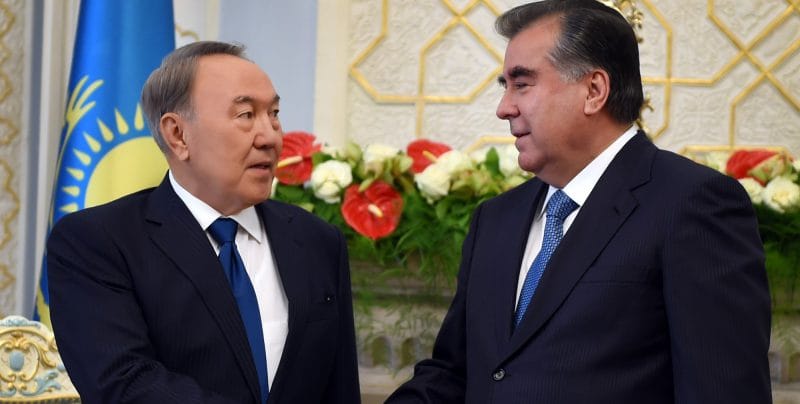
Kazakhstan’s lower chamber of parliament has ratified the Kazakhstan-Tajikistan agreement on strategic partnership, Kazakh media outlets reported on September 21.
Agreement on strategic partnership between Kazakhstan and Tajikistan was signed on September 14, 2015 in Dushanbe during Kazakh President Nursultan Nazarbayev’s visit to Tajikistan.
«Kazakhstan considers Tajikistan as a fraternal state, one of the key political and strategic partners in Central Asian region, which is defined as priority in the foreign policy of Kazakhstan. Our countries effectively cooperate within the framework of integration associations within the CIS — CSTO and SCO», — said First Deputy Minister of Foreign Affairs of the Republic of Kazakhstan Mukhtar Tleuberdi at the plenary session.
The positions of our countries on topical issues on the international agenda clearly coincide. Thus, Kazakhstan and Tajikistan have a mutual support international initiatives, in particular, Dushanbe supported Kazakhstan’s candidacy for non-permanent members of the UN Security Council for 2017-2018, the candidacy of Astana to host international exhibition EXPO-2017.
«Kazakhstan is one of the major trade partners of Tajikistan, as the volume of Kazakhstan trade with Tajikistan is the second largest after Russia. We supply wheat, mineral products, machinery and technical equipment. In turn, Tajikistan exports raw materials, fruits, nuts, vegetables to Kazakhstan. Due to the influence of external factors, the bilateral trade decreased by 17%», — said M. Tleuberdi.
As noted, the analysis showed that in 2015 the volume of import and export cargo transportation between Kazakhstan and Tajikistan amounted to nearly 2 million tons, an increase at 30 million since 2014.
The agreement on strategic partnership between Kazakhstan and the Republic of Tajikistan was committed on September 14, 2015 in Dushanbe. In accordance with the terms of the Agreement, the Parties base relations on the equality, mutual trust, and strategic partnership. In the case of a negative impact on mutual security interests, the Parties pass to appropriate consultation mechanism for the coordination of positions and the coordination of practical measures to resolve this situation. The Parties are to take the necessary measures to expand and deepen mutually beneficial trade and economic cooperation, including the diversification of the commodity nomenclature and create the necessary enabling environment – noted Tleuberdi.
According to the Agreement, the Parties shall cooperate in military and military-technical spheres, in the sphere of civil defense, as well as promote cooperation in science and technology, health, education, culture, tourism and sport.











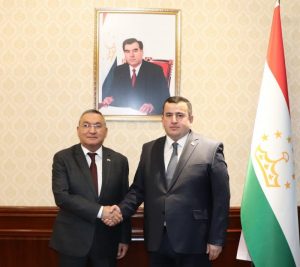 Tajikistan, Kazakhstan Discuss Expanding Economic and Trade Cooperation
Tajikistan, Kazakhstan Discuss Expanding Economic and Trade Cooperation Tajikistan and India Discuss Expanding Industrial and Technology Cooperation in New Delhi
Tajikistan and India Discuss Expanding Industrial and Technology Cooperation in New Delhi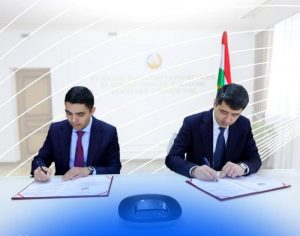 Tajikistan to Modernize Postal Services through Automation Project
Tajikistan to Modernize Postal Services through Automation Project International Tourist Train “Jibek Joly” (“Silk Road”) to Arrive in Dushanbe for Navruz Festival
International Tourist Train “Jibek Joly” (“Silk Road”) to Arrive in Dushanbe for Navruz Festival Information Security Training Held in Dushanbe
Information Security Training Held in Dushanbe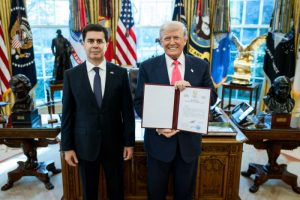 Tajik Ambassador Presents Credentials to President Donald Trump
Tajik Ambassador Presents Credentials to President Donald Trump First Pilot Container Train Launched on China–Tajikistan Route
First Pilot Container Train Launched on China–Tajikistan Route Leader of the Nation: Despite Numerous Economic and Financial Difficulties, We Created a National Army
Leader of the Nation: Despite Numerous Economic and Financial Difficulties, We Created a National Army Tajikistan to Host International Festival “Navruz – Cultural and World Heritage” in March
Tajikistan to Host International Festival “Navruz – Cultural and World Heritage” in March Tajikistan Promotes Digital Transformation Agenda at AI Impact Summit
Tajikistan Promotes Digital Transformation Agenda at AI Impact Summit Tajikistan Expands AI Cooperation with Google DeepMind
Tajikistan Expands AI Cooperation with Google DeepMind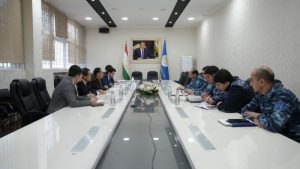 Tajik Customs, Japanese Firm Sign Deal on Cargo Scanning Upgrade Project
Tajik Customs, Japanese Firm Sign Deal on Cargo Scanning Upgrade Project














